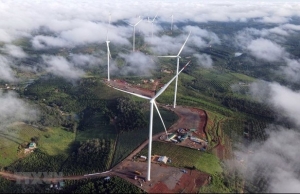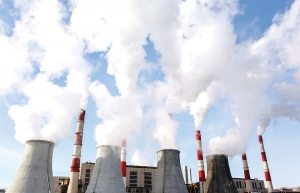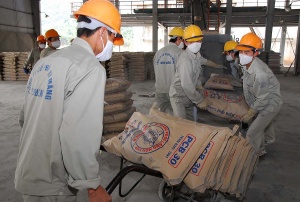A decarbonisation plan for local businesses
How are the carbon-intensive industries doing with decarbonisation globally and locally?
 |
| Antonio Della Pelle, manufacturing decarbonisation lead in East Asia and Pacific for the International Finance Corporation |
We all need to double down on our efforts because, according to the latest reports, the world is not on track for the Paris Agreement’s 1.5°C target.
It is not easy to decarbonise the hard-to-abate sectors like chemicals, cement, steel, aluminium, fertilisers, and manufacturing industries, but at the same time it is not impossible. Our region needs to battle emission reductions while the demand for manufacturing products still keeps growing to serve economic growth.
In manufacturing alone, hard-to-abate industries have seen the largest emission growth rate in the region are the cement, steel, chemicals, and fertiliser sectors. Many multinationals are struggling to deliver on their net-zero and low-carbon commitments.
There is a new factor that excites me about the future: nowadays, when we talk to CEOs about their decarbonisation plans, we get the recurring answer that decarbonisation is a hot topic in the organisation not because the country has set net-zero targets, but because it is a business-critical survival requirement to remain financially competitive. We will soon start to see more and more companies announcing actual projects and investments as part of the implementation of the decarbonisation roadmap.
What are the challenges for Vietnamese manufacturers, especially in the cement, steel, and plastics sectors, in transitioning to a low-carbon pathway?
These industries are heavily exposed to the export market. According to the United Nations COMTRADE database, in 2021, Vietnam Exports of iron and steel were about $12 billion, cement about $1.8 billion, and plastic about $7 billion. These days, regulations for carbon reduction are increasing in these industries, including the Carbon Border Adjustment Mechanism of the European Union and anti-dumping tariffs.
All these factors are impacting the profitability of the Vietnamese companies on one hand, but if Vietnamese companies wants to continue exporting, low carbon products are the only answer. It is paramount for Vietnamese companies to include the decarbonisation roadmap as part of the wider company business strategy. Doing nothing is not an option.
What should be the business case for manufacturers to shift to low-carbon production?
Decarbonisation is a problem that can be solved if everyone works together. For example, some of the decarbonisation levers are new technologies such as green hydrogen and Carbon Capture Utilisation and Storage (CCUS).
However, there will never be a commercially viable business case if a single company plans to decarbonise their operation by embarking on, for example, a green hydrogen or CCUS project alone. These projects need economy of scale to become feasible.
Industrial parks represent an ideal playground for decarbonisation because, by definition, they are populated by dense industry manufacturing players that offer by default optimisation of resource efficiency and maximisation of synergies and demand aggregation. Vietnam hosts more than 400 parks and this is a unique opportunity to embark in decarbonisation as one team.
What actions are needed from the government and companies to push this shift?
Policymakers, industry, and financial institutions need to sit around the same table and design the journey together.
Policymakers will need to provide guidance with standards, regulations, green procurements and setting targets. Industry will need to implement actions, double down on research and development, greening the supply chain, and clusterise. And financial institutions will need to develop financing solutions to support commercially viable projects, double down on disclosure and environmental, social, and governance reporting for transparency
What is the International Finance Corporation’s (IFC) plan for supporting the Vietnamese manufacturing sector in this pathway?
The IFC has been supporting Vietnam’s sustainable development to boost its economic competitiveness by helping attract international investors to sectors such as finance, infrastructure, manufacturing, and renewable energy. We invest, mobilise financing from third parties, and advise the private sector, including small- and medium-sized enterprises with strong growth potential.
To support Vietnam’s manufacturing decarbonisation journey, IFC will provide in-depth support to facilitate accelerated uptake of solutions and helping to identify and structure relevant strategies for our clients; encourage the development or expansion of markets for low-carbon steel, cement, and plastic recycling; and address financing and other challenges associated with the implementation of decarbonisation roadmaps.
 | Japan, US, Australia to assist Vietnam in decarbonisation Government-backed financial institutions from Japan, the US, and Australia have pledged to support Vietnam's efforts to cut carbon emissions, according to the chairman of the Japan Bank for International Cooperation (JBIC). |
 | Taking a five-step approach towards decarbonisation Companies are facing geopolitical upheavals, supply chain disruption, inflation, and the threat of recession. Despite this perfect storm, their commitment to decarbonisation has not fundamentally wavered. The number of companies embracing science-based targets is continuing to grow at a rapid pace. |
 | Energy-intensive industries urged to approach decarbonisation objectives Cement, plastic, and steel industries in Vietnam are being expected to actively participate in Vietnam’s circular economy as decarbonisation will be key to ensure their sustainable development. |
What the stars mean:
★ Poor ★ ★ Promising ★★★ Good ★★★★ Very good ★★★★★ Exceptional
Related Contents
Latest News
More News
- Trung Nam-Sideros River consortium wins bid for LNG venture (January 30, 2026 | 11:16)
- Vietnam moves towards market-based fuel management with E10 rollout (January 30, 2026 | 11:10)
- Envision Energy, REE Group partner on 128MW wind projects (January 30, 2026 | 10:58)
- Vingroup consults on carbon credits for electric vehicle charging network (January 28, 2026 | 11:04)
- Bac Ai Pumped Storage Hydropower Plant to enter peak construction phase (January 27, 2026 | 08:00)
- ASEAN could scale up sustainable aviation fuel by 2050 (January 24, 2026 | 10:19)
- 64,000 hectares of sea allocated for offshore wind surveys (January 22, 2026 | 20:23)
- EVN secures financing for Quang Trach II LNG power plant (January 17, 2026 | 15:55)
- PC1 teams up with DENZAI on regional wind projects (January 16, 2026 | 21:18)
- Innovation and ESG practices drive green transition in the digital era (January 16, 2026 | 16:51)

 Tag:
Tag:




















 Mobile Version
Mobile Version